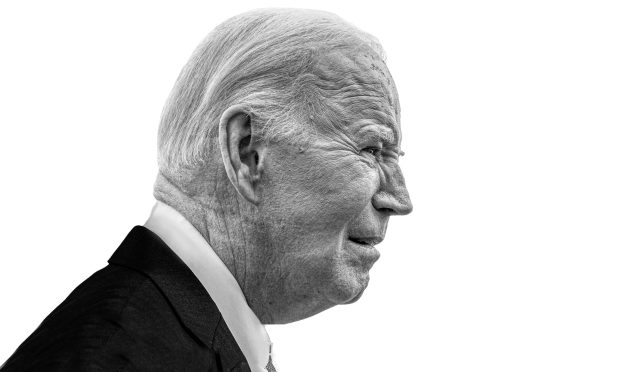
The world looked on as Joe Biden swithered about stepping back from being president of the USA at 81 after making several confusing gaffes in a TV debate with Donald Trump.
Trump, who at 78 is hardly a spring chicken himself, looked somewhere between amused and confused, before accusing Biden, left, of being too old.
It had all the grace of two bald men fighting over a comb, which both are growing too old to use.
The decision to leave the most powerful office in the world has highlighted one of the biggest dilemmas of our age – when do we quit our jobs?
The Institute of Fiscal Studies says that 31% of people are in paid work between 66 and 69 and some are still in place in their 80s.
At least a third of Scottish judges and sheriffs are over 60, supermarket check-outs are being manned by retired office workers on part-time hours and B&Q’s profits rose 18% when they actively employed older people who looked like many of their customers.
However, Oscar Wilde nailed it when he said: “With age comes wisdom, but sometimes age comes alone.”
‘We can’t diagnose health from snapshots’
While most of us won’t get a crack at running the country, it would be a mistake to write off the elderly, says Terry Quinn, professor of Cardiac Ageing at Glasgow University.
He has worked for decades with many elderly patients at Glasgow Royal Infirmary.
“The dream is that we all age well but the reality is different for many of us,” he said.
“On Biden, there are so many people who claim to be able to make an armchair diagnosis on others, but if you took selective pieces of film of any of us on a working day there would be moments when we would look puzzled and confused.
“We cannot diagnose someone’s health on the strength of a few filmed moments or snapshots of their lives. However, he is an older man who is ageing, and everyone can see he is slower in his responses – which is normal for his age.
“Our reactions slow, and we acquire illnesses and so working on can mean coping with problems such as angina.
“The tipping point of deciding to retire is when you find it exhausting or too difficult to manage.”
He described the huge change in life expectancy which is driving the pressure to work on.
“In the 1960s men retired at 65, women at 60 and many males had a heart attack, women usually later.
“Today, with extending life expectancies (77 for men and 81 for women) if you retire at 60 you can be only up to two thirds the way through your life.”
Ageing population
Around 45,000 Scots are now over 90, double that of 20 years ago.
Professor Quinn points to China which announced big changes to its retirement age this week.
Its Pension Development report said it expected it to rise to 65 from 60 for men, 55 for women in white-collar jobs and 50 for women in factories and other working-class roles.
The UK’s age of 66 will rise to 67 in less than two years’ time and again to 70 in 10 years’ time.
It’s a warning shot to the middle-aged to keep working into their 70s.
Employers need to wake up to their growing older workforce, Professor Quinn added.
He said: “They need to take notice of older workers and use them as mentors to pass on their experience to young people in a mentoring way.”
He says that older people holding on to top jobs can make it difficult for younger people to move up the career ladder.
“The other societal problem is of not retiring and allowing younger ones to take their jobs,” he explained.
But bridging the gap between older workers and younger employees can benefit both.
“Mentoring allows experienced workers to pass on their wisdom so that younger ones in turn can move into the jobs,” he added.
“We need an older generation of mentors who can job share to give those behind them an easy route into the jobs.”
He believes that writing off older people is bad for them and for workplaces.
“It’s important though, that society allows older people to live their best lives.
“By the time you are in your late 60s and 70s employers need to take note of this.
“This means understanding their needs as workers and allowing them to carry out vital roles as long as they feel able.”
A Tayside taxi company proved that point.
The owner said: “We couldn’t stay in business without one of our workers in her late 70s doing three backshifts a week.
“She looks after her grandchildren on the other days and we are happy to have her.”
Making offices, factories and other workplaces friendly for older workers can generate £9 billion to the economy, says the UK Centre for Better Ageing.
The pressure to keep them in jobs means mega boosts to government coffers in tax and less reliance on benefits…as long as we are healthy enough.
‘Socialise, get out, exercise and have a direction’
Speaking from a boat while salmon fishing in the middle of the River Tay in Perthshire, Professor Ewan MacDonald is on a break from his full-on job as head of Glasgow University’s Healthy Working Lives Group.
He is in his 70s and mentoring a busy research group investigating how countries can extend working lives and prevent ill health in retirement. His CV includes the first occupational health study of high-altitude climbing Sherpas, undertaken as a way of combining business with pleasure.
With the luck of a clear mobile signal he reveals why he is still top of his game – and why he wants to stay there.
“I will work as long as I am able to and am perfectly capable just now.
“It is important to have a purpose whether you are working, volunteering or just pursuing a hobby. I was lucky to inherit good genes. Sadly, not all of us do, which can make illness more likely.
“One of the most important tools for good ageing is to socialise, get out and exercise and have a direction to go in every day.”
He believes that we have a responsibility to pass on our skills and enthusiasm for life to other people.
It’s a vital role in his job as department head.
The fish on the Tay are not biting today, but he remains optimistic.
“That’s probably a metaphor for life because you have to approach work and life with the attitude that you can do it, and that almost everything is possible,” he adds.

Enjoy the convenience of having The Sunday Post delivered as a digital ePaper straight to your smartphone, tablet or computer.
Subscribe for only £5.49 a month and enjoy all the benefits of the printed paper as a digital replica.
Subscribe © Xinhua/Shutterstock
© Xinhua/Shutterstock © UNIVERSITY OF GLASGOW
© UNIVERSITY OF GLASGOW